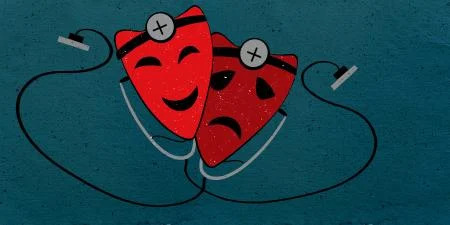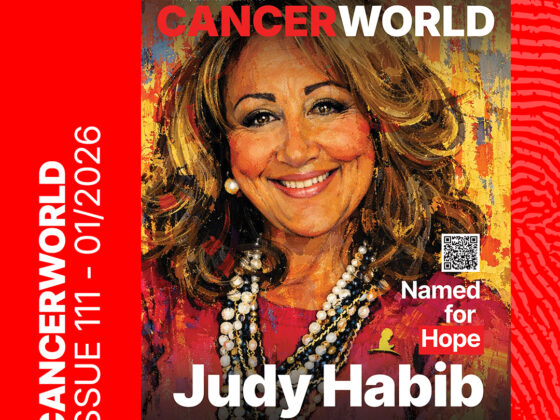“I don’t know what I’ll find in there. It could be cancer. In the best case, you’ll be stuck with a bag for the rest of your life.” Those are the words Paweł Grabowski, a fit and health-conscious 48-year-old from Warsaw, remembers hearing from his surgeon just before being wheeled in for emergency surgery for a perforation in his colon. He also vividly remembers his terror at the prospect that he might wake up from surgery to find an open hole in his belly. But that is what happened. A week later, he returned home with a stoma that was not a welcome companion.
While the doctor and nurse had informed him about the technical aspects of living with a bowel attached to the outside of his stomach, wrapping his head around the new situation was hard. How do you hang out with friends when you have a stoma? How do you talk about your new attachment? Many patients face the same experience: people go silent around you when they know you’ve got ‘it’. Their eyes search for the bag. Can they see a bulge through your clothes? They discreetly sniff the air, to check if they can smell anything.
Paweł accepts it is natural that the people around him wanted to know everything about his life post-surgery, and he also understands they didn’t know how to ask. He himself took some time to come to terms with his new situation. But in the end he did find a way to make friends with his stoma bag, and eventually gave it a name. Louis. “Check if Louis is leaking!” he joked with a nurse at the clinic. Eh? “You know Louis Vuitton bags, don’t you? Well, my bag is Louis.”
The doctor and nurse burst into laughter. Bag, pouch, stoma – these were the terms they were used to, medical and technical. No one had ever asked them to change a bag named like a personalised accessory before. The stoma nurse, whose role was to teach patients how to attach the adhesive plate to the hole in their belly and fix the bag to it, was used to seeing patients approach this task with fear – turning their heads away, hating to look at their stoma. But when Paweł introduced his bag as ‘Louis’, the mood in the room lightened. “With Louis, it’s easier to break the ice,” Paweł comments. He came up with the name more for the benefit of his friends than himself, so they wouldn’t feel awkward talking about it, he says. What was needed, he realised, was humour, a touch of irony. Something that, in oncology, can feel like a gift.
Humour and oncology
The saying that ‘laughter is the best medicine’ has been around a long time, promoted by popular belief and many doctors through the ages, but more recently by academic researchers. Many of its benefits may be particularly important for people facing serious and potentially life-threatening conditions. Humour can help regain a sense of control over the uncontrollable – if you can laugh at yourself, you create some distance from your fate. It can mitigate anxiety and depression, help ease pain, and make it easier to relax and focus on things that make life better.
87% of patients undergoing radiotherapy said they felt that the use of humour by their oncologists was ‘somewhat’ or ‘very’ important
A 2020 survey of cancer patients undergoing radiotherapy at the Ottawa Hospital Cancer Centre, in Canada, found that a high proportion value humour in their interactions with oncologists. Responses showed that 87% felt that the use of humour by their oncologists was ‘somewhat’ or ‘very’ important during their visits. Almost 80% said it was important in helping reduce their anxiety, and 70% said it was an important aid to remembering what they were told. More than 60% of respondents said they themselves used humour ‘frequently’ or ‘always’ when discussing their own cancer.
A survey of oncologists conducted Netherlands Cancer Institute, in Amsterdam, explored their use of humour in interactions with patients with ‘prolonged incurable cancer’. Of 34 respondents, 71% reported using humour sometimes, with a further 26% reporting frequent use. The survey also found that the humour was often initiated by patients themselves, with 76% of respondents reported this occurring ‘sometimes’ and a further 18% ‘very often’.
Situations where oncologists found humour could be helpful included to ‘break the ice’ in tense situations, or to downplay situations – depending on the patient and the situation. By contrast, humour was generally seen as inappropriate in conversations involving breaking bad news or where survival gain/loss could be at stake – though again, that could vary by patient and situation.
Humour in adult cancer care
In an article published in 2012, in the Journal of Advanced Nursing, a group of oncology nurse specialists at King’s College London defined the concept of humour in adult cancer care as “a subjective emotional response, resulting from the recognition and expression of incongruities of a comic, absurd and impulsive situation, remark, character, or action, which enhances feelings of closeness or togetherness when shared in the context of trust between the patient and nurse and may be used as a coping mechanism in a stressful situation such as the adult cancer care setting.”
Mary Tanay, President-Elect of the UK Oncology Nursing Society, has written many studies on the use of humour in adult oncology, including a 2014 article ‘A time to weep and a time to laugh: humour in the nurse-patient relationship in an adult cancer setting’, and an analysis of the concept of humour in adult cancer care (see box above). “Humour can be useful for coping and managing stressful situations. It can also foster good therapeutic relationships and level power between patients and clinicians,” she says, but she cautions that, “for it to be emotionally supportive and caring, it must be used sensitively with continuous assessment and reflection on what patients need, their prompts and preferences.” Some situations are clearly a ‘no-go’ for humour, she adds, “for example when breaking bad news or when someone had just died”.
“Humour can foster good therapeutic relationships and level power between patients and clinicians”
Tanay also points out that an individual’s sense of humour is shaped by many factors, including experiences, culture, beliefs and personality, all of which needs to be taken into account when attempting humorous remarks. “Humour is subjective and some people welcome humour more than others. Thus, I always take the patient’s lead on whether to use humour in our interactions,” she adds.
Krystyna de Walden-Gałuszko, a leading psycho-oncologist in Poland, agrees that is important to read the patient when using humour. “An oncologist has to be part psychologist, constantly adapting their communication to the patient’s situation, and observing them. I always remind this at seminars: pay attention to body language. It helps you pick up on whether the patient is depressed or tense and how to gauge their readiness for jokes.”
A patient’s use of humour during cancer depends in part on their internal resources and how they previously dealt with life’s hardships, says de Walden-Gałuszko. “It’s crucial to avoid making them feel guilty for not coping well. “You can’t force it.”
Patient humour
Judging by surveys of oncologists and cancer patients, most health professionals working in an oncology setting will be familiar with the humour that patients themselves use, not just to help themselves, but also to help family and friends, as well as other patients, deal with their situation.
Examples quoted by people interviewed for this article include a wry look at the ‘upsides’ of how the disease or treatment side effects could be ‘improving’ ultimately trivial aspects of their lives: what they are saving on shampoo, conditioner and hairdressers thanks to losing their hair; how their figure is improving thanks to serious weight loss; how reducing their speech volume to a whisper meant people were no longer intimidated by their once thunderous voice.
While it can be funny when patients choose to step back and make a joke of it, a survey among patients with advanced breast cancer has shown that comments made by people who are not facing a similar situation that downplay the seriousness of their condition – I wouldn’t mind losing weight, I wouldn’t mind losing my hair – can be extremely unwelcome.
Jacek Jassem, one of Poland’s leading oncologists, is able to reflect on the use of humour from the dual perspective of both clinician and patient. He was diagnosed with a potentially life-threatening advanced non-Hodgkin lymphoma in 2018, and went through some very tough times during his treatment. “I’ve learned to look at my illness with some distance. Sometimes, I even joked about it, though sometimes it was laughing through tears,” he says. Joking provided relief when he was going through treatment. “My body suffered, but my spirit needed a lift,” he says.
“Humour helped me keep the disease from taking over my life, so as a doctor, I know it’s my responsibility to make sure it doesn’t take over my patients’ lives either. I ask them about the books they’ve read or the movies they’ve watched. Casual chats about a patient’s interests often lead to a joke or two,” he says.
While his experience as a patient gives him an unusually close insight into when and with whom to use humour in clinical practice, Jassem says a lot of these skills come with experience. The more cancer patients an oncologist sees, the better they get at reading them and what they need, he says.
“It took a moment or two before Jassem understood that he was being invited by his patient to share the joke”
Jassem recalls his uncertainty and confusion during his early oncology days when one of his older patients, with a very poor prognosis, surprised him by responding with ironic humour to what had been intended as an encouraging remark. “I wanted to be nice, so I said, ‘You look great!’ And he replied, ‘You should’ve seen how great my father looked in his coffin! I guess it runs in my family.’”
It took a moment or two before Jassem understood that he was being invited by his patient to share the joke.
That discomfort and uncertainty about the right response to humour in the context of a serious illness is one that many oncology professionals will have felt, particularly early in their careers, and was the topic of a recent article by palliative care physician who works in the UCSF Symptom Management Service in San Francisco, titled ‘Should I Laugh at That? Coping in the Setting of Serious Illness’.
Poorly judged humour
Testicular cancer has long been one of the more treatable cancers, and it is reasonable for an oncologist to feel fairly relaxed and confident with the diagnosis. It is not reasonable, however, to assume patients will feel the same way. Szymon Chrostowski, who now runs a Polish cancer advocacy organisation, still remembers the highly inappropriate humour used by the doctor who informed him, age 20, that he had cancer. “Obviously, you have cancer!” the doctor announced after examining him. “What does that mean?” Szymon asked cautiously. “We’ll remove one of your nuts, give you some chemo, your hair will fall out, but it’ll grow back, and you’ll live,” the doctor responded, with a smile. “I wasn’t laughing,” says Szymon. “I downed a bottle of vodka after returning home, figuring it couldn’t hurt anymore. Over time, I realized the doctor could joke around because he knew the prognosis for patients like me. But at that moment, I was devastated.”
A learning curve
Jassem believes that young doctors rarely smile because they are dealing with patients facing grave difficulties and uncertainty, and they don’t want to come across as inappropriate or appear to be intruding into their patient’s private life. “Young doctors are so focused on being serious and respectful that they forget – or maybe no one taught them – that every patient expects more than just cold professionalism from us.”
Tanay agrees that it is a learning curve. While she may now be a leading authority on the use of humour in oncology, at the beginning of her career her attention was taken up with getting the core task done. “I think that is the same for all jobs; a novel practitioner can only accommodate other things once you are comfortable with the main task,” she says. It’s not that she never laughed with her patients, but in the early days, that humour was more spontaneous. Now she also uses it intentionally, when the timing is right: “This normally happens when I have developed rapport with my patient, know them and have assessed what level or kind of humour they would engage with.
De Walden-Gałuszko reports a similar learning curve, starting from her days working as a psychiatrist in a hospice. “I was very strict and reacted almost like our patients – I was shocked and scared.” Learning to use humour was a gradual process, she said, helped along by her husband, also a psychiatrist, who showed her how humour could defuse tense situations. “In the end, I learned humour from the patients themselves – especially from those who were the most cheerful.” In her view, humour works best for patients in advanced stages of illness because it becomes a life raft, pulling them out of despair. “But while acknowledging the power of this tool, you have to know when to use it and how.”
“While acknowledging the power of this tool, you have to know when to use it and how”
Leszek Kraj, an oncologist at the Medical University of Warsaw, has achieved popular recognition for his sensitivity when it comes to interacting with patients. He specialises in gastrointestinal cancers, many of which – bile duct, liver, pancreas – have been slow to benefit from the progress seen in other cancers. In 2022 he was elected the most empathetic doctor in Poland.
Kraj says he often uses humour to help patients get the cruel and crude statistic of mean survival rates into context, telling them: “Well, I’ve got two legs, and my cat has four, so between us, we’ve got an average of three. And that’s how you should look at statistics.”
He also uses it to try to reduce the high levels of stress inflicted by long waiting times: “In countries like Poland, where the healthcare system isn’t exactly in top shape, a sense of humour can help doctors defuse those emotional landmines, making the long waits for test results or doctor appointments a bit more bearable,” he says.
On a more optimistic note, he comments, treatments for many cancers are improving, and it’s easier to bring humour into the equation when more patients are responding well to treatments. “When I started working 10 years ago, I had nothing to offer a liver cancer patient in Poland,” he notes. Today, he has several options, and many patients respond well to treatment – and to his jokes as well.
Kraj believes that oncology will need to get more comfortable with humour, especially since more patients are being treated for much longer. “This means we, as oncologists, get to know our patients longer, better, and they bond with us. And in such long-term relationships, there’s a lot more room for humour.”
Humour and oncological outcomes
There is growing evidence to show that chronically high levels of stress hormones are associated with raised risk of progression and recurrence, including some mechanistic studies showing how these hormones promote metastasis. Together with evidence that humour can reduce stress hormones, and also boost immune function, this opens intriguing questions around whether humour can have an impact on oncological outcomes in addition to patients’ quality of life.











